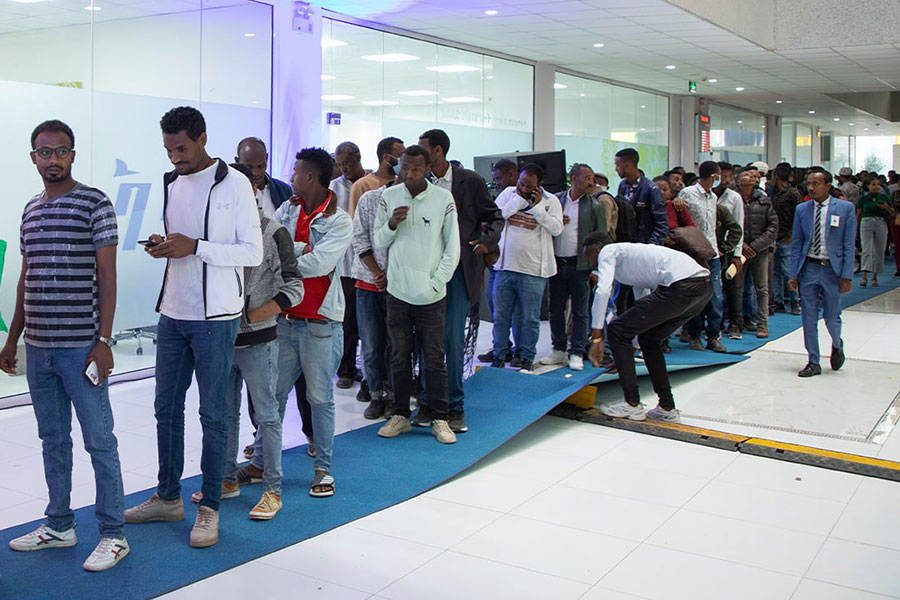
Commentaries | Mar 12,2022
Feb 19 , 2022
By Carolyn Kissane
A conversation between two women of different lingo-cultural groups, ages and religions surprised me. At first, I thought they were talking in Amharic but as they kept conversing, I realized it was another language spoken as a first language by one of them. They seemed to enjoy the banter. I could pick up some of the words they were saying as they were mixing Amharic words in the middle. To my surprise, one of them started swearing in the other’s religion because the other one kept asking her to say it to make sure what she was saying was true.
They are both from different religious groups and backgrounds, yet that did not stop them from being friends and enjoying each other’s company. It should be a regular thing in modern times but it has not been the case for a while. Among other possible factors, what brought them together was having a common communication tool which happens to be language. It restored my hope in society. Perhaps this was the solution to social fracture staring us in the face for such a long time – learning other languages aside from our mother tongue. It could help better integrate cultures and customs.
There will always be conflict between peoples, over resource or convictions, even between groups with the same values and a common history. We can go far in addressing friction by communicating better through the resource of language.
Imagine two people from different lingo-cultural groups arguing over politics and one of them starts responding in the language of the other. This shows respect and consideration for the cultures and customs of the other. It could make a significant difference and be the key to attaining national understanding powered by dialogue.
If there were a way to include other national languages in the educational system, and if students were assigned to spend summer in a region outside where they were born, they would get to experience the culture and be able to communicate in the same tongue. It could start at high school, with elective classes in local languages. It should be a free course but not graded. Instead, it could be considered a miscellaneous activity that makes a difference in college admissions.
The impact could be considerable. Language is a powerful tool as most of our problems arise from a lack of clear communication. Imagine if a person from one ethnic group is talking to another person from a different one but using their mother tongue; the person is likely to feel understood, not judged. And they would neither assume the worst of the other ethnic group nor believes that they are out there to get them. It would bring people together and create tolerance.
If anyone has a hard time imagining why language is a powerful tool for identifying with those that have different customs and cultures, just remember how well a non-national that drops Amharic words here and there is received. Suddenly, they have shown they have made an effort to familiarise themselves with the culture. They become a trusted ally, not someone alien. The same could be applicable between different lingo-cultural groups.
It is also never useless to learn more than one language. We expand our horizons that way, learn about the country more and widen our circle of friends. We can visit and live in more places without a language barrier and better facilitate business transactions.
But none of this will happen in a vacuum. There should be an effort towards a national program that introduces students to other cultures and parts o f the country. No matter how costly it would be, it would pay off immensely as it would be beneficial for the country's unity.
PUBLISHED ON
Feb 19,2022 [ VOL
22 , NO
1138]


Commentaries | Mar 12,2022

Editorial | Jan 25,2020

Viewpoints | Oct 03,2020

Viewpoints | Sep 26,2021

Films Review | Feb 01,2020

Commentaries | May 25,2019

Life Matters | Jun 12,2021

Fortune News | Jul 15,2023

Agenda | Jul 17,2022

Agenda | Jun 05,2021

My Opinion | 131970 Views | Aug 14,2021

My Opinion | 128359 Views | Aug 21,2021

My Opinion | 126296 Views | Sep 10,2021

My Opinion | 123912 Views | Aug 07,2021

Dec 22 , 2024 . By TIZITA SHEWAFERAW
Charged with transforming colossal state-owned enterprises into modern and competitiv...

Aug 18 , 2024 . By AKSAH ITALO
Although predictable Yonas Zerihun's job in the ride-hailing service is not immune to...

Jul 28 , 2024 . By TIZITA SHEWAFERAW
Unhabitual, perhaps too many, Samuel Gebreyohannes, 38, used to occasionally enjoy a couple of beers at breakfast. However, he recently swit...

Jul 13 , 2024 . By AKSAH ITALO
Investors who rely on tractors, trucks, and field vehicles for commuting, transporting commodities, and f...

Jul 5 , 2025
Six years ago, Ethiopia was the darling of international liberal commentators. A year...

Jun 28 , 2025
Meseret Damtie, the assertive auditor general, has never been shy about naming names...

Jun 21 , 2025
A well-worn adage says, “Budget is not destiny, but it is direction.” Examining t...

Jun 14 , 2025
Yet again, the Horn of Africa is bracing for trouble. A region already frayed by wars...

Jul 6 , 2025 . By BEZAWIT HULUAGER
The federal legislature gave Prime Minister Abiy Ahmed (PhD) what he wanted: a 1.9 tr...

Jul 6 , 2025 . By YITBAREK GETACHEW
In a city rising skyward at breakneck speed, a reckoning has arrived. Authorities in...

Jul 6 , 2025 . By NAHOM AYELE
A landmark directive from the Ministry of Finance signals a paradigm shift in the cou...

Jul 6 , 2025 . By NAHOM AYELE
Awash Bank has announced plans to establish a dedicated investment banking subsidiary...